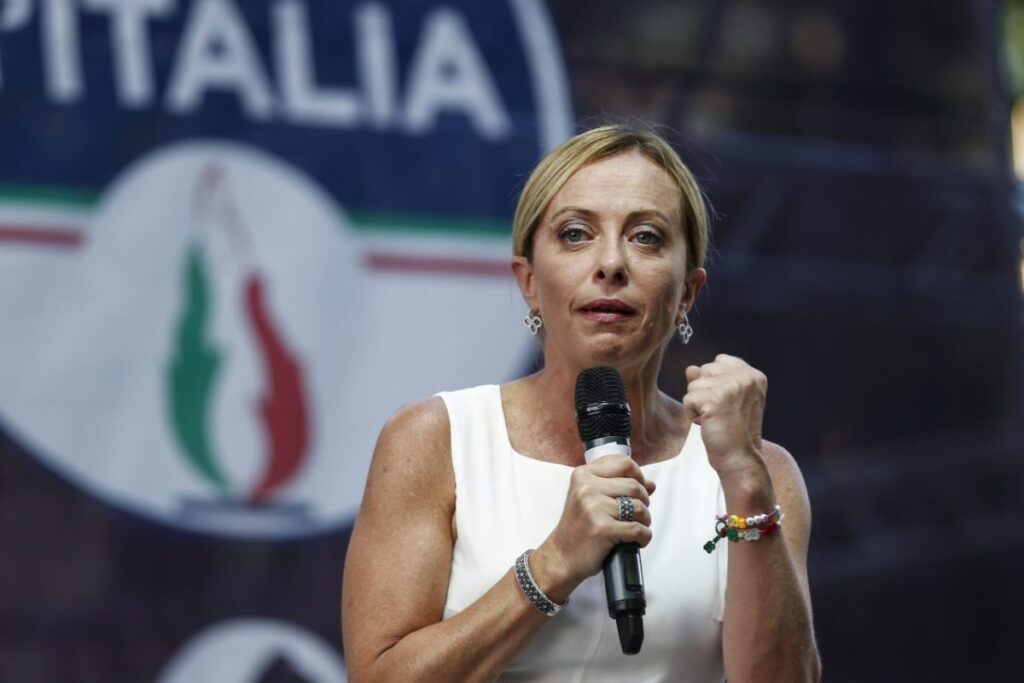On the home front, her agenda includes constitutional and economic reform —
plus a bold infrastructure project that Garibaldi would endorse.

Italy’s new prime minister, Giorgia Meloni, is peripatetic in her pursuit of a more assertive Italy on the world stage. Though she underscored the enduring friendship between Rome and Paris during a recent informal meeting with President Macron, she made clear that Italy will not be relegated to the EU’s second tier.
The two leaders’ parley also included a discussion about the Ukrainian war and migrants flocking across the Mediterranean. In a telephone tête-à-tête with Chancellor Scholz, the Italian Premier reiterated what she had told Mr. Macron: Europe must confront its energy crisis with vigor while continuing to support Ukraine.
Following Russia’s invasion, Italy quickly diversified its energy imports, striking agreements for natural gas with Algeria and Egypt. Other suppliers include Angola and the Republic of Congo. Additionally, Rome purchased two liquefied natural gas vessels, supplementing its three existing natural gas terminals.
While Ms. Meloni has benefitted from these deals negotiated by her predecessor, Mario Draghi, she is demonstrating a political flexibility that belies her reputation as a rigid ideologue. Moreover, her vociferousness in rebuking Mr. Putin’s actions — and supporting President Zelensky — has kept her pro-Putin coalition partner, the ex-premier, Silvio Berlusconi, in check.
The prime minister’s discussion with Herr Scholz included a commitment to strengthen Italo-German ties. Afterward, the Italian government issued a statement stressing “the progress made at the European level” and noting the two agreed on “the urgency of arriving at concrete measures to reduce energy prices as soon as possible.”
Even so, unity regarding energy does not necessarily mean subservience elsewhere. Ms. Meloni has long maintained that the Berlin-Paris axis within the EU and NATO relegates Italy to a marginal role in world affairs. She aims to ensure that such servility will end on her watch.
And Italy’s foreign minister, Antonio Tajani, is reaffirming Italy’s leading role in promoting this agenda — especially with respect to the war in Ukraine: “It’s clear that our objective is achieving peace, but there can be no peace without justice, that is, without independence for Kyiv.”
Mr. Tajani added that when peace does come, Italy “will be called upon to play a leading role in the reconstruction of Ukraine.” Ms. Meloni will remind the President of the European Commission, Ursula von der Leyen, of Rome’s centrality when the Italian Premier journeys to Brussels on November 3.
On the home front, Prime Minister Meloni has made it a priority to forge a more stable Italian government. Though her coalition did not attain the supermajority of two-thirds of seats in both houses of parliament to enact that reform, she intends to introduce a referendum to give voters the opportunity to do so.
“We will not give up on reforming Italy if we are faced with prejudicial opposition,” the premier said in an address to parliament. In a nation well-known for the brevity of its governments, she is determined to “give Italy an institutional system in which whoever wins governs for five years.”
Such a change in Italy’s constitution, among other benefits, would enable the government to more readily achieve sustained economic growth, erase outmoded labor practices, bolster Research & Development, slash bureaucracy — and promote broad-based entrepreneurship.
Whether or not that reform occurs, the finance minister, Giancarlo Giorgetti, may be the best possible individual to succeed in creating the conditions for a second Italian “economic miracle.” According to Mr. Giorgetti’s predecessor, Daniele Franco, the new finance minister is “very suitable” for the job:
“We share the idea that Italy’s economic development depends on what happens in the production system, first and foremost in manufacturing and services, that these sectors are at the heart of our ability to create income and that they must therefore be at the center of economic policy.”
Cognizant of Italy’s debt issues, Mr. Giorgetti will be careful to avoid the budgetary missteps of the UK’s former Prime Minister, Elizabeth “Liz” Truss. Undoubtedly, Ms. Meloni’s Deputy Prime Minister, and Infrastructure Chief, Matteo Salvini agrees that Mr. Giorgetti has the right stuff; he is a member of Mr. Salvini’s Lega.
Both the Lega and Mr. Salvini have come a long way. The original Lega Nord, or Northern League, was a regionalist party founded in 1984 by the benighted Umberto Bossi, an out-and-out secessionist who shunned the mezzogiorno. Mr. Salvini experienced an epiphany years later, rejecting Mr. Bossi’s intolerance and transforming the Lega into a patriotic party embracing southern and central Italy.
Mr. Salvini recently declared that building the world’s longest suspension bridge across the Strait of Messina — linking mainland Italy with Sicily — would be a boon to the nation. He added that the Ponte sullo Stretto would “create more than 100,000 jobs.” Somewhere in the cosmic firmament, Garibaldi, Cavour, and Mazzini are smiling — not to mention Giorgia Meloni. -RAI




I said it before give her a chance. She seems to be on the right track, and she is working for the changes that Italy desperately needs.